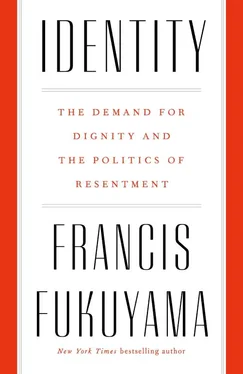Luther was one of the first Western thinkers to articulate and valorize the inner self over the external social being. He argued that man has a twofold nature, an inner spiritual one and an outer bodily being; since “no external thing has any influence in producing Christian righteousness or freedom,” only the inner man could be renewed.
Faith alone can rule only in the inner man, as Romans 10[:10] says, “For man believes with his heart and so is justified,” and since faith alone justifies, it is clear that the inner man cannot be justified, freed, or saved by any outer work or action at all, and that these works, whatever their character, have nothing to do with this inner man. {2} 2 Martin Luther, Christian Liberty , ed. Harold J. Grimm (Philadelphia: Fortress Press, 1957), 7–8.
This recognition—central to subsequent Protestant doctrine—that faith alone and not works would justify man in one stroke undercut the raison d’être for the Catholic Church. The Church was an intermediary between man and God, but it could shape only the outer man through its rituals and works. Luther was horrified by the decadence and corruption of the medieval Church, but the more profound insight was that the Church itself was unnecessary and, indeed, blasphemous in its efforts to coerce or bribe God. Luther himself would not be the teenager brought back to obedience by society; rather, society itself would have to adjust to the demands of the inner person. Though it was not Luther’s intention, the Reformation brought about exactly this result: the decline of Rome as the Universal Church, the rise of alternative churches, and a whole series of social changes in which the individual believer was prioritized over prevailing social structures.
Social theorists have long debated whether the monumental changes that took place in Europe following the Reformation—what we call modernization—were the product of material forces or were driven by ideas such as those of Luther. Karl Marx and contemporary neoclassical economists would say that Luther’s ideas were derivative of the material conditions: had there not been widespread economic discontents and divisions among the German princes, his views would never have spread the way they did. On the other hand, the sociologist Max Weber argued for the primacy of ideas: the very material conditions that economists study could only come about because they were legitimated by changes in the way people thought about them; similar conditions in previous times did not produce the same results because the intellectual climate was different.
In my view, both positions capture part of the truth, because causality moves in both directions at once. Material conditions obviously shape people’s receptivity to certain ideas. But ideas have their own inner logic, and without the cognitive framing they provide, people will interpret their material conditions differently. This affects our understanding of the evolution of the concept of identity, since it was driven by both an evolution in thought and the changing conditions of the broader society as Europe began the process of socioeconomic modernization.
On the plane of ideas, we can see that the distinction between inner and outer, and the valorization of the former over the latter, starts in an important sense with Luther. [1] Many centuries before Martin Luther, Augustine went through a similar tortured exploration of his inner self in his Confessions . Unlike Luther, however, his writings did not devalue established social institutions or trigger massive upheavals in the politics and society of his time.
Like many subsequent thinkers struggling with the question of identity, he began with an agonizing quest to understand himself, and the way in which he might be justified before God. This inner man was not good; he was a sinner, but could yet be saved through an inner act of belief that could not be made visible by any external action. Thus Luther is responsible for the notion, central to questions of identity, that the inner self is deep and possesses many layers that can be exposed only through private introspection.
Yet Martin Luther stands far from more modern understandings of identity. He celebrated the freedom of the inner self, but that self had only one dimension: faith, and the acceptance of God’s grace. It was a binary choice: one was free to choose God, or not. One could not choose to be a Hindu or a Buddhist or decide that one’s true identity lay in coming out of the closet as gay or lesbian. Luther was not facing a “crisis of meaning,” something that would have been incomprehensible to him; while he rejected the Universal Church, he accepted completely the underlying truth of Christianity. {3} 3 Charles Taylor, Sources of the Self: The Making of the Modern Identity (Cambridge, MA: Harvard University Press, 1989), 18.
The second sense in which Luther had not yet arrived at the modern understanding of identity was that his inner self did not seek public recognition of its newfound freedom. Indeed, he agonized over his own motives: he sought to avoid the taint of self-satisfaction, knowing “himself to be an incorrigible sinner, incapable of escaping what he called concupiscence (the sin of doing the right thing not merely to please God but with an eye to self).” {4} 4 Elton, Reformation Europe , 196.
While he received enormous recognition in his lifetime and was capable of monumental bouts of righteous anger, his doctrine of faith was built on the private relationship of man to God and not on any form of public approval.
Nonetheless, the distinction between inner and outer had been established and could be filled with new forms of inner freedom by subsequent thinkers who did not accept Martin Luther’s Christian worldview.
By the late eighteenth century, the idea at the core of modern identity had evolved much further and now took on a secular form. The Canadian political theorist Charles Taylor has written the definitive account of this process, and in it, the philosopher Jean-Jacques Rousseau plays a central role. {5} 5 See Taylor’s Sources of the Self and Multiculturalism: Examining the Politics of Recognition (Princeton, NJ: Princeton University Press, 1994).
Rousseau was the fundamental source of many ideas that would later be critical to a host of modern trends: democracy, human rights, communism, the discipline of anthropology, and environmentalism. For him, however, the natural goodness of the inner self was a theme that tied together his varied political, social, and personal writings. {6} 6 See Arthur M. Melzer, The Natural Goodness of Man: On the System of Rousseau’s Thought (Chicago: University of Chicago Press, 1990).
Rousseau reversed the Christian moral evaluation of the inner human being. Christians such as Luther believed in original sin: human beings were fallen creatures who could be redeemed only through God’s love. In his Discourse on the Origins of Inequality , Rousseau argued that the first human being—man in the state of nature—was not sinful. The characteristics we associate with sin and evil—jealousy, greed, violence, hatred, and the like—did not characterize the earliest humans. In Rousseau’s account, there was no original human society: early people were fearful, isolated creatures with limited needs, for whom sex but not the family was natural. They did not feel greed or envy; their only natural emotion was pity for the suffering of others.
According to Rousseau, human unhappiness begins with the discovery of society. The first humans began their descent into society by mastering animals, which “produced the first movement of pride in him.” They then started to cooperate for mutual protection and advantage; this closer association “engendered in the mind of man perceptions of certain relations… which we express by the words great, little, strong, weak, swift, slow, fearful, bold, and other similar ideas.” The ability to compare, and to evaluate, other human beings was the fountainhead of human unhappiness: “Men no sooner began to set a value upon each other, and know what esteem was, than each laid claim to it, and it was no longer safe for any man to refuse it to another.” Rousseau denounces the shift from amour de soi (love of self) to amour propre (self-love or vanity); simple self-interest is transmuted into feelings of pride and the desire for social recognition. {7} 7 Jean-Jacques Rousseau, Oeuvres complètes de Jean-Jacques Rousseau , vol. 3 (Paris: Éditions de la Pléiade, 1966), 165–66. Author’s translation.
Читать дальше












